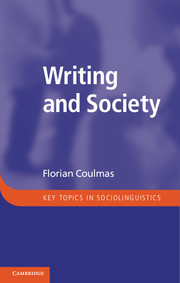Book contents
- Frontmatter
- Contents
- List of illustrations
- List of tables
- Preface
- Acknowledgements
- 1 The tyranny of writing and the dominance of vernacular speech
- 2 The past in the present and the seeds of the public sphere
- 3 Written and unwritten language
- 4 Literacy and inequality
- 5 The society of letters
- 6 Writing reform
- 7 Writing and literacy in the digitalized world
- Notes
- Bibliography
- Index
7 - Writing and literacy in the digitalized world
Published online by Cambridge University Press: 05 February 2013
- Frontmatter
- Contents
- List of illustrations
- List of tables
- Preface
- Acknowledgements
- 1 The tyranny of writing and the dominance of vernacular speech
- 2 The past in the present and the seeds of the public sphere
- 3 Written and unwritten language
- 4 Literacy and inequality
- 5 The society of letters
- 6 Writing reform
- 7 Writing and literacy in the digitalized world
- Notes
- Bibliography
- Index
Summary
Instant updates from your friends, industry experts, favourite celebrities, and what's happening around the world.
DYKWUTBFrom the chosen through the initiated to everyone – admittedly rather compressed, but this in brief is the social history of writing from its beginnings to the present time. Writing has come a long way since its invention, but, notwithstanding the many changes it has undergone, it still is recognizably the same: the generation and recording of meaning in the visual mode. Yet the circumstances in which we make use of the written word are as different from those of Assyrian, Greek and Chinese antiquity as are the technologies employed then and now. The progression from clay tablets to touch screens is the path of civilization (Baron 2009), which has been welcomed and resisted, praised and cursed at every juncture along the way. The benefits of writing were highlighted by the Greek philosopher Diodoros (Siculus), who, in the first century BCE, underlined the great importance he assigned to it, stating that ‘while it is true that nature is the cause of life, the cause of the good life is education based on the written word’ (quoted from Harris 1989: 26). Millions of written pages later, Gottfried Leibniz (1646–1716), the greatest scholar of his time, who firmly believed in the perfectibility of humanity, was much more sceptical, expressing his fear that ‘after uselessly exhausting curiosity without obtaining from our investigations any considerable gain for our happiness, people may be disgusted with the sciences, and that a fatal despair may cause them to fall back into barbarism. To which result that horrible mass of books which keeps on growing might contribute very much’ (Leibniz 1680/1951: 29). On the other hand, there is, of course, no shortage of voices in praise of the written word, which has not only freed us from the limitations of human memory, but also expanded access to intellectual achievements.
- Type
- Chapter
- Information
- Writing and SocietyAn Introduction, pp. 126 - 151Publisher: Cambridge University PressPrint publication year: 2013



